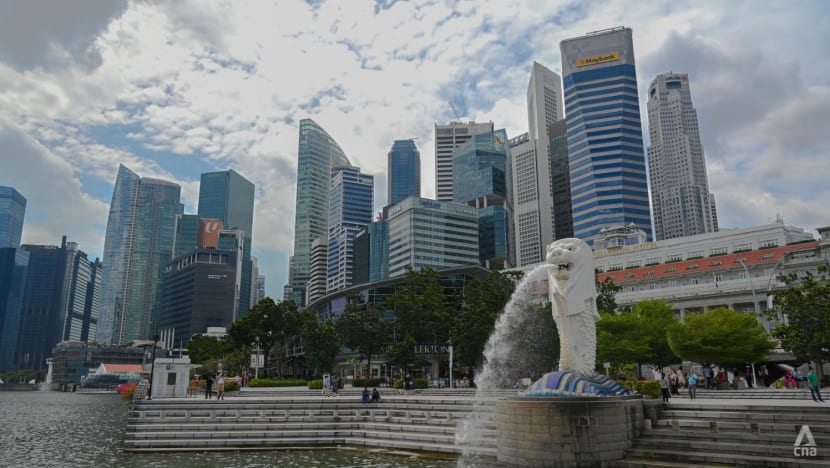More ultra-wealthy families setting up offices in Singapore, and they’re not just coming from Asia
The COVID-19 pandemic has forced these ultra-high net worth individuals to rethink how to safeguard their wealth, industry observers say.

A view of Singapore's central business district and the Merlion on Nov 16, 2022. (File photo: CNA/Hanidah Amin)
SINGAPORE: More super-rich families are setting up offices in Singapore to manage their wealth, with the number of such offices nearly doubling from two years ago.
Singapore currently has about 700 family offices, up from 400 in end-2020 and up sevenfold from 2017, according to government estimates.
These families are coming not only from Asia, but also Europe and America. Demand from Asia is particularly prominent though, given that private wealth in the region has grown faster than elsewhere in the world, industry observers said.
“The pandemic has prompted numerous affluent families to reconsider their wealth management and succession plans to better prepare against future uncertainty,” said Bank of Singapore’s head of family office advisory Carrie Ng.
“Besides Asian family offices, an increasing number of non-Asian families are coming to Singapore to either set up family offices or satellite offices to capture and support their investments in the region.”
The increase has been fuelled by the COVID-19 pandemic, which forced ultra-high net worth individuals and their families to rethink how to safeguard and grow their wealth for future generations, said Deloitte’s private leader for Southeast Asia Richard Loi.
They are also drawn to Singapore with its strong track record as a financial and weath management hub, other experts said.
Observers noted several factors that give Singapore an edge over other financial hubs like Hong Kong, Switzerland and the United Kingdom.
These include having a stable political and regulatory environment, a developed financial services sector and trained workforce, as well as good living standards with established healthcare and education infrastructure.
Geography is another reason, with Singapore seen as a gateway to Asia. This is attractive to those who desire to be closer to their investments in the region, said Mr Loi.
Singapore has also been providing support for family offices through targeted tax incentives. Additionally, the launch of the Global-Asia Family Office Circle network in 2021 allows a “trusted ecosystem” for industry players to collaborate and share best practices, said Ms Foo Mee Har, chief executive of the Wealth Management Institute and Member of Parliament.
What are family offices?
Family offices are private organisations set up to manage the wealth of a family.
There are generally two types of such offices.
The first is a single family office, which provides wealth management services like those offered by top-tier private banks for one family. This is a highly tailored organisation that often reflects the characteristics and aspirations of the family it serves, said Deloitte’s private leader for Southeast Asia Richard Loi.
The second is a multi-family office, which provides the same services for several families.
A single family office is not required to be registered or licensed by the Monetary Authority of Singapore as they do not manage third-party funds. On the other hand, a multi-family office is a licensed or registered fund management company.
Some family offices in Singapore are offshoots of existing family offices that have been established in locations such as the United Kingdom and the United States, said Mr Stephen Banfield, partner of family office and private clients at KPMG in Singapore.
“This is increasingly common for very large dynastic structures. Many of these foreign structures have already crossed a number of generations and are highly professional,” he added.
Besides investments, the functions of a family office can include finance, philanthropy, tax and wealth planning. With that, family offices also hire accountants, lawyers and other administrative professionals based on their needs.
Typically, a single family office starts off with two investment professionals and grows according to the needs of the family, said Mr Loi.
For multi-family offices, the number of investment professionals will depend on the number of families that they serve. This model allows for cost-sharing among a few families, so the scale of activities that they oversee can be broader and they tend to have a larger team, he added.
Mr Stephen Banfield, partner of family office and private clients at KPMG in Singapore, said that the setting up of a family office is often complicated and involves “an intersection of considerations”.
“Singapore is a jurisdiction where the ultra-rich will often choose to live in and establishing a local family office can be part of a migration strategy,” he added.
“Often, the ultra-rich are driven by commercial considerations in deciding where to live so it is usually a more complicated decision matrix, rather than a comparison of tax rates and lifestyle factors.”
The tougher tax rules introduced by the Monetary Authority of Singapore (MAS) last year are unlikely to dent Singapore’s attractiveness going forward, experts added.
The rules, which took effect in mid-April, include minimum requirements for capital, local investments and hiring of talent for family offices to qualify for tax incentives.
For example, applications for funds managed or advised directly by a family office must have a minimum fund size of S$10 million at the point of application and S$20 million within two years, under the new Section 13O of the Income Tax Act.
Family offices under this section must also hire at least two investment professionals. Previously, there were no minimum requirements for both fund sizes and employees.
These new rules reflect the authorities’ intention to enhance the quality of family offices in Singapore and generate positive spin-offs for the Singapore economy, said Bank of Singapore’s Ms Ng.
“Instead of dampening the set-up of family offices in Singapore, we believe the growth trend will continue even with the new guidelines,” she said.
HOW WILL THIS BENEFIT SINGAPORE?
The growth spurt in family offices can benefit Singapore in several ways, experts said.
For one, they add to the assets under management here, strengthening the country’s status as a global wealth management hub, and contribute to the vibrancy of the local financial services ecosystem.
These help to create more jobs in related sectors, such as private banking, legal and tax advisory, estate planning and professional services, said Ms Foo.
Citing the Bank of Singapore’s experience, Ms Ng said authorities have shown “increased stringency” when it comes to assessing the academic and professional experience of proposed investment professionals hired by family offices.
This has resulted in higher demand for local professionals with related expertise, she added.
The number of investment professionals employed by family offices is equivalent to about 1 per cent of the number of people employed by financial institutions last year, according to a written parliamentary reply on Monday by Mr Tharman Shanmugaratnam, Senior Minister and Minister in charge of MAS.
So far, the growth in family offices has not resulted in a sizeable outflow of talent from financial institutions, with efforts being made over the years to grow the sector’s talent pool, he added.
Specifically for family offices, two skills maps that set out the necessary competencies of workers at family offices and external service providers were rolled out in 2021. These skills maps have been used by training providers such as the Wealth Management Institute to develop relevant programmes.
The Wealth Management Institute said it has had more than 1,200 participants in its family office training programmes since 2020. Its goal is to enroll 5,000 people by 2025.
Singapore firms and more broadly, the economy, also stand to see benefits, with tax rules kicking in last year requiring family offices to allocate at least 10 per cent or S$10 million of their assets to local investments.
Ms Foo said she has seen a greater interest in private market investing among family offices, which will be positive in supporting innovative technologies and business models here.
Together with more focusing on environmental, social and governance metrics for their investments, family offices can also be tapped as “patient capital” for areas such as tackling climate change, experts said.
“Funding social and environmental causes cover a broad range of initiatives from blended finance through to capacity building, and to pure grant-making,” said Mr Banfield.
“Singapore is certainly well placed to leverage these opportunities which are fundamental to some family offices from the outset, and for others, a planned evolution.”
A new opportunity lies in philanthropy – an area that the ultra-rich is paying more attention to.
“Philanthropy is now becoming more deliberate, strategic and impactful,” said Ms Ng, adding that the younger generations now prefer active engagements with social enterprises and supporting social entrepreneurship, rather than simply writing a cheque.
The Wealth Management Institute, together with the MAS and the Private Banking Industry Group, is working on an initiative to generate awareness in strategic philanthropy among family offices and tackle social issues collectively.
Apart from that, the Government is reviewing its tax incentive schemes to see how it can encourage family offices to give more and support local charities and non-profit entities, Deputy Prime Minister Lawrence Wong said during the inaugural Global-Asia Family Office Summit's owners' symposium last September.
“These are all multi-year plans, but our basic message is this: If you are a family office interested to give back to the local community in Asia, there is no better place to do it than here in Singapore,” Mr Wong said at the time.














